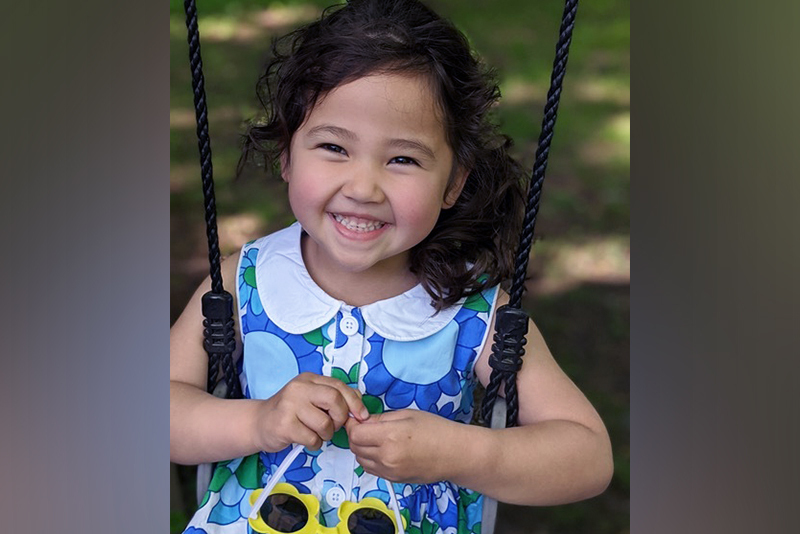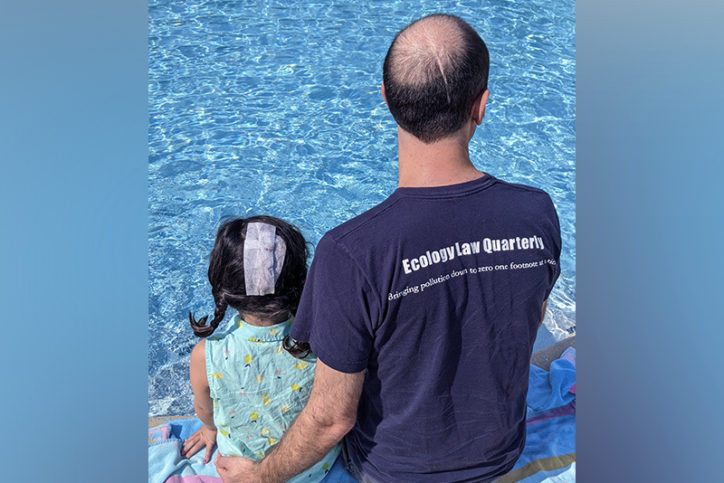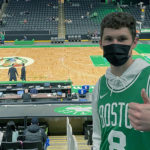Like father, like daughter: Finding care for cavernous malformations

After Charlotte Miller underwent neurosurgery, her parents, Daniel and Eliza were a little nervous to tell her that part of her head had been shaved. But the spunky 5-year-old wasn’t fazed. Instead, she pointed to her father’s head and laughed, “Now I’m going bald like you, Daddy!”
A sense of humor isn’t all Charlotte and Daniel share. They — along with Charlotte’s older sister, Avery — also have a genetic predisposition to cavernous malformations. These small masses of abnormal, thin-walled blood vessels can occur anywhere in the body but typically only cause serious problems in the brain and spinal cord. If a cavernous malformation bleeds, it can trigger symptoms such as headaches, dizziness, and seizures.
Uncovering a genetic link
Daniel knows more about cavernous malformations than most laypeople. When he was just a little younger than Charlotte, his older sister was diagnosed with one and treated by Dr. R. Michael Scott, then the neurosurgeon-in-chief at Boston Children’s Hospital. Suspecting that it might be hereditary, Dr. Scott recommended the rest of the family undergo magnetic resonance imaging (MRI) scans. Sure enough, Daniel also had a cavernous malformation. When he was 6, he also underwent surgery after it began to bleed.
Since then, researchers have identified three genes that appear to influence the risk of developing cavernous malformations; like their father, both Charlotte and Avery have one of these genes. That knowledge has led the Millers to take a proactive approach to their daughters’ care.
“We’ve been pretty upfront with them and explained that I have the same condition, which helps them understand it,” says Daniel. “They’ve had MRIs and know they have some weak points in their blood vessels. It’s helped to show them my scar and let them know I’m okay and they will be, too.”

A good sense of humor isn’t the only thing that runs in Charlotte’s family. So does a genetic propensity for cavernous malformations. Here, she and her dad show off their scars.
Back to Boston
Indeed, it was a recent MRI scan that alerted the Millers to the fact that Charlotte’s cavernous malformation had started to bleed. Although the family works with a local neurologist near their home in the Washington, D.C., area, they also sent Charlotte’s scans to Dr. Scott, with whom they had stayed in touch. He, in turn, introduced them to Dr. Edward Smith, co-director of Boston Children’s Cerebrovascular Surgery and Interventions Center.
“We did a video conference with Dr. Smith so he could meet Charlotte,” explains Daniel. “He was so approachable and walked us through her scans and explained what would happen during surgery.” Feeling confident in their decision, the Millers decided to travel to Boston for the procedure in July 2021.
Along the way, nurse practitioners Christopher Isibor and Jennifer Judge, as well as coordinator Kristen Grip, helped prepare Charlotte and her family for surgery. Dr. Scott even stopped by to say “hello” — 31 years after he operated on Daniel.
A silver lining
The procedure was a success and Charlotte is on the mend. “She’s full of energy and is very resilient,” says Daniel — so energetic that it was difficult for her to stay out of the pool while she healed during the rest of the summer. She understands that she could develop another bleed, as could her dad or sister. But for the Millers, that knowledge is power.
“It helps to have a community of other people with cavernous malformations, like the Angioma Alliance and other groups,” says Daniel. “And in some ways, the fact it’s familial has been a silver lining for us, because we’re all dealing with it together. It may be rare, but we’re not alone.”
Learn more about the Cerebrovascular Surgery and Interventions Center or make an appointment.
Related Posts :
-

Sharing our journey with cavernous malformations
Finley and her twin sister, Rowan, were born seven weeks premature on November 7, 2017 in Scranton, Pennsylvania. In July 2019, Finley was ...
-

Grace: Developing her inner ninja after brain surgery
The McGuigans were enjoying a family dinner at a favorite restaurant last October when their lives took an unexpected turn. ...
-

Another shot for Conner: Getting back in the game after brain surgery
Watch Conner Hicks coach basketball at Midlakes Middle School in Clifton Springs, New York, and you’ll see a young ...
-

When surgery shapes your life: Moyamoya patient turned doctor
Elizabeth Kwak is living proof of how far the treatment of moyamoya has come. Twenty-four years ago, Elizabeth had pial ...





